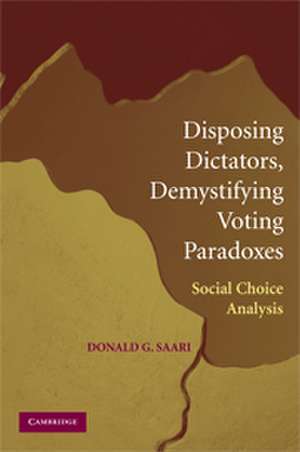Disposing Dictators, Demystifying Voting Paradoxes: Social Choice Analysis
Autor Donald G. Saarien Limba Engleză Hardback – 24 aug 2008
Preț: 422.80 lei
Nou
Puncte Express: 634
Preț estimativ în valută:
80.91€ • 86.51$ • 67.46£
80.91€ • 86.51$ • 67.46£
Carte tipărită la comandă
Livrare economică 18 aprilie-02 mai
Preluare comenzi: 021 569.72.76
Specificații
ISBN-13: 9780521516051
ISBN-10: 0521516056
Pagini: 256
Ilustrații: 6 b/w illus.
Dimensiuni: 156 x 236 x 19 mm
Greutate: 0.68 kg
Ediția:1
Editura: Cambridge University Press
Colecția Cambridge University Press
Locul publicării:New York, United States
ISBN-10: 0521516056
Pagini: 256
Ilustrații: 6 b/w illus.
Dimensiuni: 156 x 236 x 19 mm
Greutate: 0.68 kg
Ediția:1
Editura: Cambridge University Press
Colecția Cambridge University Press
Locul publicării:New York, United States
Cuprins
1. Subtle complexity of social choice; 2. Dethroning dictators; 3. Voting dictionaries; 4. Explaining all voting paradoxes; 5. Deliver us from plurality vote; 6. Appendix.
Recenzii
'The future generations of social choice theorists will certainly find much inspiration and profound insights in this book. For anyone working in the field of voting and social choice the book will provide a rich collection of results, methodological tools, and challenging open problems.' Hannu Nurmi, Academy of Finland
'Donald Saari provides not only an engaging and accessible explanation of the celebrated dictatorial theorems of Arrow, Sen, and Chichilnisky but also an intuitive argument for why we should not be surprised by the negative results of these seminal theorems.' Tommy Ratliff, Wheaton College
'Arrow's theorem is at the origin of the birth of modern social choice theory in the late 1940s and 1950s. Sen's theorem on liberalism and the Pareto principle (published in 1970) created an upsurge of fundamental studies in the so-called non-welfaristic issues in normative economics. Both results are essentially negative (impossibilities). Saari, in this book, demonstrates that we must not overestimate these negative aspects. Particularly noteworthy are the remarkable presentations of the topological approach to social choice and of the generic stability of the core of voting games (including a very short introduction to a new solution concept, the finesse point), where Saari, once again, shows his wonderful pedagogical talent.' Maurice Salles, University of Caen
'… The book is definitely of interest to students and researchers from many different areas having to deal with aggregation problems. … most entertaining and illuminating, there is a lot to learn from this book for everyone who cares about whether voters elect what they really want.' Mathematical Reviews
'The book is definitely of interest to students and researchers from many different areas having to deal with aggregation problems. … there is a lot to learn from this book for everyone who cares about whether voters elect what they really want.' Journal of the American Statistical Association
'Donald Saari provides not only an engaging and accessible explanation of the celebrated dictatorial theorems of Arrow, Sen, and Chichilnisky but also an intuitive argument for why we should not be surprised by the negative results of these seminal theorems.' Tommy Ratliff, Wheaton College
'Arrow's theorem is at the origin of the birth of modern social choice theory in the late 1940s and 1950s. Sen's theorem on liberalism and the Pareto principle (published in 1970) created an upsurge of fundamental studies in the so-called non-welfaristic issues in normative economics. Both results are essentially negative (impossibilities). Saari, in this book, demonstrates that we must not overestimate these negative aspects. Particularly noteworthy are the remarkable presentations of the topological approach to social choice and of the generic stability of the core of voting games (including a very short introduction to a new solution concept, the finesse point), where Saari, once again, shows his wonderful pedagogical talent.' Maurice Salles, University of Caen
'… The book is definitely of interest to students and researchers from many different areas having to deal with aggregation problems. … most entertaining and illuminating, there is a lot to learn from this book for everyone who cares about whether voters elect what they really want.' Mathematical Reviews
'The book is definitely of interest to students and researchers from many different areas having to deal with aggregation problems. … there is a lot to learn from this book for everyone who cares about whether voters elect what they really want.' Journal of the American Statistical Association
Notă biografică
Descriere
This book is a positive analysis of voting 'paradoxes' and argues that negative 'impossibility' results are not justified.
